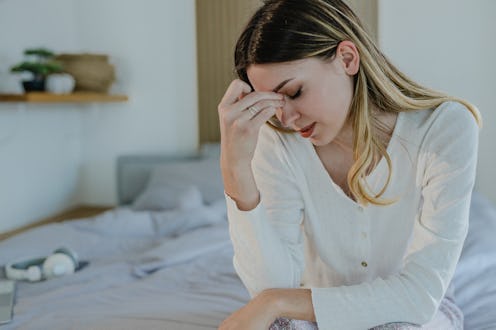Life
How Your Menstrual Cycle Can Affect Your Mental Health

Everyone's period is different, but many can agree — your menstrual cycle can definitely affect the way you feel physically, mentally, and sometimes emotionally.
According to the American College of Obstetricians and Gynecologists, approximately 85 percent of people who menstruate experience symptoms of PMS. In some cases, these symptoms can include irritability, fatigue, anxiety, and depression. In addition, three to nine percent of women experience premenstrual dysphoric disorder (PMDD), a severe case of PMS with symptoms so severe, people can't keep up their daily routines.
Our menstrual cycles have a serious impact on our mental health, and yet often society dismisses this with an eye roll and a snarky comment about it being Shark Week or something. The symptoms of menstruation have become a joke because they're traditionally a women's problem, and therefore, not worth taking seriously.
But while we're still a ways away from society taking our periods seriously (just think of how regularly our President uses periods as a punchline), we can at least educate ourselves about how they can affect our bodies and minds. Our menstrual cycles are divided into four phases, each of which affects our hormones and by extension, our mental health, quite differently.
Here's what you can expect from each phase.
Menstruation
Menstruation, or the week you get your period, can be a rollercoaster. Many people feel bloated and sluggish during the first day or two of their periods, and some struggle with painful cramps that can take a toll on you, emotionally. But about halfway through, as estrogen levels rise, your mood lifts, and you begin to see the light at the end of the tunnel.
Follicular Phase
As estrogen and testosterone levels rise leading up to ovulation, mood tends to improve. According to Dr. Suzanne Gilberg-Lenz, an OB-GYN in Beverly Hills: "As the brain starts to 'tell' the ovary to get ready to ovulate, estrogen slowly rises and a feeling of well-being and calm prevail."
Ovulation
Testosterone levels spike at the very beginning of ovulation, and so does sex drive. Not only will many people crave sex more, they'll feel sexier as well. One study even found that exotic dancers made on average twice as much while they were ovulating than they did on their periods.
But beware, while the first days of ovulation may be fun, by the end, estrogen and testosterone levels drop, and progesterone levels rise, which can make people feel lethargic. Some also experience a small "pre-PMS" during this time, which can lead to increased irritability and strong food cravings.
Luteal Phase
The Luteal Phase, also known as PMS week. Although different people experience different symptoms, the week leading up to menstruation often leaves us feeling sad, anxious, and irritable, due to low levels of estrogen.
PMS can also aggravate existing mental illnesses, such as depression, and if symptoms intensify significantly, it might be time to seek professional health.
"We are all unique within the confines of a broad outline or pattern," explains Dr. Gilberg-Lenz. "But if a symptom is disrupting your life and making it difficult or impossible to maintain relationships, go to school or work, then it's time to seek medical advice.